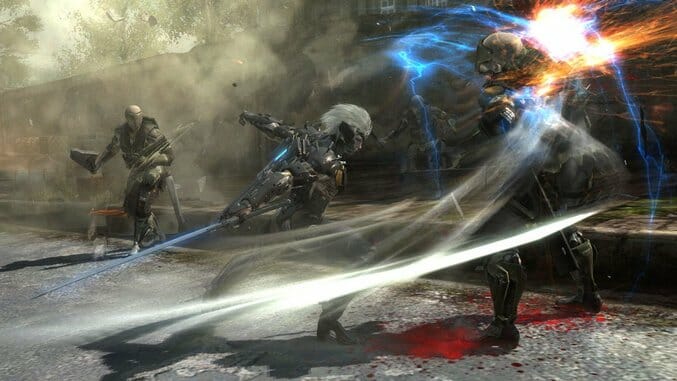Metal Gear Rising: Revengeance (Multi-Platform)

“…I’m not talking about money, Jack.”
The speaker, a beefy man resembling a samurai in a high-tech battle suit, flippantly gestures to Raiden, Hideo Kojima’s pretty-boy-agent-turned-badass-cyborg. Raiden sits atop an idling motorcycle stopped on a hot, deserted road in the middle of nowhere.
“I’m talking ideals.”
“Excuse me?” Raiden asks, perhaps mirroring the player.
“…Forget it.” The cyborg ninja’s heavily-corded adversary dismisses the thought with a shake of his head. “We’ve both heard enough speeches about higher causes by now.”
The line passes without special emphasis, but for hardcore Metal Gear fans it may be hard not to chuckle. Kojima’s directorial penchant for long-winded philosophy has long been a divisive cornerstone of Metal Gear Solid’s narrative pastiche, and as Raiden prepares for a late-game face-off against his rival Samuel’s high-frequency blade, it is a battle of ideologies, albeit simple ones: two swords of opposing stripes fighting for the right to, well, kill each other.
Like the rest of Metal Gear Rising (or as it is more aptly subtitled, Revengeance), you’re not quite sure if at this moment the scriptwriter (incidentally not an employee of Platinum Games but Kojima Productions itself) might be poking fun of Metal Gear Solid’s narrative legacy or is just trying his best to ape it. At times these are probably two sides of the same coin. Ideologically, this makes Revengeance a weird game to approach.
This expectation is hardly new. The game was outright scrapped in 2011 by Kojima Productions after its initial incarnation—where Raiden could cut absolutely anything rendered in-game to pieces—was deemed literally impossible to program. Transmuted into an over-the-top action title, Revengeance’s completion marks the first time the bulk of development on a major, original Metal Gear title has been handed off to another studio.
But in the absence of Snake, Ocelot and close to everything else you’ve come to expect from Metal Gear in the past decade-plus of Kojima’s guiding hand, there’s an even stranger question perpetually looming throughout Raiden’s ripping slice-and-dice yarn. Stripped of its expected components, what exactly is Metal Gear?
Despite its broader trappings as a loose Metal Gear Solid 4 epilogue of sorts, Platinum doesn’t exactly have an answer. There is arguably no better studio to handle this sort of plasmatically stylish affair, and I won’t deny the sheer joy of slowing down time to carefully choose the angle Raiden’s blade will repeatedly take as it bites into a weakened PMC soldier or mooing bipedal Gekko.
That said, I’m of two minds over Platinum’s interpretation. Yes, its Metal Gear-ishness can be a little existentially suspect—the mad scientist of Raiden’s support group at one point outright explains that unmanned gears have made the manually piloted Metal Gear models of old obsolete, making fan-service appearances appear somewhat uneven, if not just sporadically thrown in to make sure you remember what universe you’re in.
-

-

-

-

-

-

-

-

-

-

-

-

-

-

-

-

-

-

-

-

-

-

-

-

-

-

-

-

-

-

-

-

-

-

-

-

-

-

-

-









































